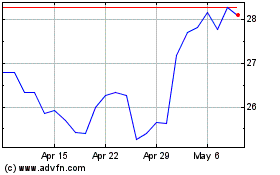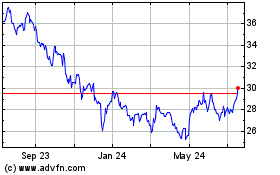Pfizer, Glaxo Agree to Create Over-The-Counter Drug Giant -- 3rd Update
December 19 2018 - 7:09AM
Dow Jones News
By Denise Roland
Pfizer Inc. and GlaxoSmithKline PLC plan to combine their
consumer health-care units and eventually spin off the joint
venture, creating the world's largest seller of drugstore staples
like Advil and Sensodyne toothpaste.
The deal, announced Wednesday, is an unexpected conclusion to a
yearlong process by Pfizer to shed its consumer business, as it and
other pharmaceutical companies focus more on higher-margin
prescription drugs. Glaxo has been pursuing the same focus, though
has until now stayed committed to its consumer business, which its
chief executive led before her promotion to the top job.
Glaxo will hold a 68% stake and Pfizer the remaining 32% in the
new joint venture, which generated combined sales of $12.7 billion
last year and will be the world's largest over-the-counter
medicines business. It also will sell brands like nicotine
replacement gum Nicorette, heartburn tablets Tums and Centrum
multivitamins.
The British company said it expects to close the deal in the
second half of 2019 and then separate the joint venture within
three years via a listing on the U.K. stock market.
That planned move will represent a breakup of Glaxo, which
currently generates around a quarter of its revenue from such
consumer products. For Pfizer, consumer health represents a smaller
slice of its overall business, at around 7% of total revenue.
Investors welcomed the news, sending Glaxo shares up 7% in early
trading in London.
The deal will free up both companies to concentrate on
prescription medicines, which tend to be more profitable, though
higher risk. Companies have used the steady revenue of consumer
drugs to insulate them from the sometimes boom-and-bust cycles of
developing the next blockbuster treatment. For Glaxo, that role
will fall to the vaccines business -- which tends to generate
steadier revenue flows -- after it sheds consumer healthcare.
Pfizer also sells vaccines, as well as generic drugs.
"There are benefits to having a broader structure but these are
significantly outweighed by the value creation of the deal we are
announcing today," Glaxo Chief Executive Emma Walmsley said on a
call with reporters.
She said the increased cash flow from the joint venture would
allow the company to invest heavily in its pipeline of new
medicines. Bringing the two businesses together will also allow
them to cut costs: the companies said they expected savings of
GBP500 million ($570 million) a year by 2022.
For Pfizer, the deal represents a late swan song for departing
Chief Executive Ian Read, who earlier this year failed to sell the
consumer health-care business in an auction. Glaxo had been one of
the bidders in that process but walked away because it didn't want
to acquire the business outright, according to Ms. Walmsley.
"It became obvious that for both parties there was tremendous
value creation opportunity here in an all-equity transaction, and
that was the real difference versus where we were earlier in the
year," she said.
This deal is Ms. Walmsley's biggest move yet to reshape Glaxo,
and builds on the company's $13 billion buyout earlier in the year
of Novartis AG's stake in a previous consumer health-care joint
venture.
Since taking the helm in April last year, Ms. Walmsley has
bulked up the prescription-drug business with the $4.16 billion
acquisition of cancer drugmaker Tesaro Inc. and shed Glaxo's
nutrition business in a $3.75 billion sale to Unilever PLC.
She has also shaken up the company's top ranks and cut several
scientific programs to concentrate on researching drugs that focus
on immunology or that have a genetic basis.
Pfizer also is seeking to double down on its pipeline of new
drugs, after years of pruning investment in research and
development.
Pfizer and Glaxo aren't alone in shedding slower-growing
businesses in favor of prescription-drug pipelines. As well as
exiting its consumer health-care joint venture with Glaxo, Novartis
has sold off part of its generic-drug business. At the same time,
the Swiss health-care giant has acquired a series of businesses in
cutting-edge areas of medicine.
Sanofi SA earlier this year sold its generic-drug business
shortly after buying two biotech companies.
Bristol-Myers Squibb Co. Wednesday morning announced the sale of
its French consumer health-care business Upsa to Japan's Taisho
Pharmaceutical Holdings.
Write to Denise Roland at Denise.Roland@wsj.com
(END) Dow Jones Newswires
December 19, 2018 06:54 ET (11:54 GMT)
Copyright (c) 2018 Dow Jones & Company, Inc.
Pfizer (NYSE:PFE)
Historical Stock Chart
From Mar 2024 to Apr 2024

Pfizer (NYSE:PFE)
Historical Stock Chart
From Apr 2023 to Apr 2024
